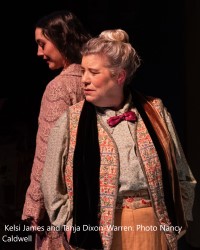
 |
 |
|
United
Players When and Where Jan.19 - Feb. 11, 2024; Thurs. - Sat evenings at 8pm, Sun matinees at 2pm; Talk backs: Thursday 14th and Sunday 17th | Jericho Arts Centre, 1675 Discovery St. Director Lois Anderson Set Design Cecilia Vadala, Costume Design Sheila White Lighting Design Ben Paul Sound Design Julia Lank Technical Director James MacIntosh Stage Manager Julia Lank Cast: Gertrude Tanja Dixon Warren Alice Kelsi James Reviewer Elizabeth Paterson |
||||||||||||||||||||||||||||||||||
| I must admit I was not looking forward to a play about Gertrude Stein and Alice B Toklas, so it is a pleasure to write that this an excellent play, cleverly directed by Lois Anderson and superbly acted by Tanja Dixon-Warren (Gertrude) and Kelsi James (Alice). In a meta-theatrical gesture (one of several), as the audience enters the auditorium, they again enter a theatre, ticket counter to stage left and stage right the bar, in the centre a shallow proscenium stage with a cheap backdrop curtain behind. Gertrude Stein will be giving a public lecture. She pours onto the stage, clad in a fabulous coat and hat and proceeds to interrogate the audience. Why are you here? Who has read all my books? Who knows who I am? It is to Dixon-Warren's credit that she is forceful but never aggressive. While Gertrude is probing her audience, proclaiming her genius, repetitively, and reciting her poetry at length, Alice slips unobtrusively around, tidying the coats, running the " lantern slides" and gazing adoringly. What is behind this fairly common view of the two? Alice draws back the curtain on Cecilia Vadasa's careful recreation of the room at 27 rue de Fleurus where Gertrude held her salon and where they both lived. Gertrude Stein was a woman of many parts: modernist writer, intellectual and member of the Paris avant-garde, best selling novelist, collector of modern art, eccentric, lesbian, friend of Vichy France. In a series of scenes, Gertrude and Alice illuminate their life with all its vagaries, doubts and certainties. Amongst the doubts is Gertrude's writer's block: has she ceased to be a genius? Amongst the certainties, Gertrude's genius, Alice's dedication. Dixon-Warren and Kelsi James play off each other with humour, zest, wit and love. Dixon-Warren brings to Stein’s verbal convolutions a clarity of thought which is illuminating. Further, she can deliver Stein’s dismissive view of "The Comma" so energetically as to leave grammar nerds in fits of laughter and raise more laughter ‘doing nothing’. Laughter and wit are a huge part of this play’s pleasure. Oh, and food, specifically butter. Together these ingredients cook up an astonishingly funny, extraordinarily immaculate, sex scene. Kelsi James slowly reveals Alice’s apparently self-effacing character as forceful, devoted certainly, but actively so. Her mobile face and delicate body language go a long way to convey thought without words, but her words are flowing. For both women this play requires an impressive feat of memory. Fully accomplished. Excellent lighting by Ben Paul changed time, place and mood effectively and smoothly. Besides the splendid hats, Sheila White has dressed the two simply, a beautuful, silky suit and blouse for Alice and an eccentric bohemian look for Gertrude which seamlessly cross the decades. The set by Cecilia Vadala dissolved easily from lecture hall to domestic living space-cum-salon backed by huge open rectangles. These spaces were used to hang the famous pictures but also to suggest wide French windows, horizons to explore and the future. Evocative sound design by Julia Lank recalled the Modernist composers, and perhaps also the musical career which Alice B. Toklas did not pursue. Piano music by Bach and Satie dripped lucid, winding, notes into the conversation. Supplemented with American jazz, the music under pinned period, style, past and future, Alice and Gertrude. While this play examines so much of Stein's work, thought and life, it is essentially a love story, one not to miss. 2024 Elizabeth Paterson |
||||||||||||||||||||||||||||||||||||
|
|
||||||||||||||||||||||||||||||||||||
|
|
||||||||||||||||||||||||||||||||||||